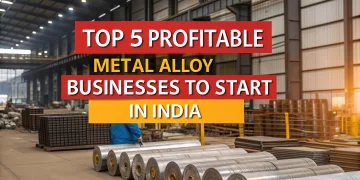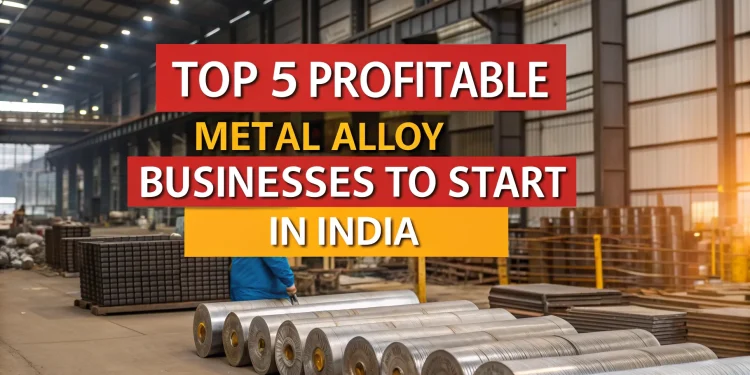India’s progress towards becoming a major manufacturing force in the world is growing faster. The country is experiencing rapid advancements in the areas of electric mobility and clean energy, as well as aerospace, infrastructure, and defense, all of which drive a strong demand for the most advanced materials. One such area of opportunity is the production of metal alloy, an industry that is not just vital to industrial growth, but also brimming with technological capabilities as well as commercial potential.
What makes this field particularly appealing is the fact that it shares the capabilities of entrepreneurs with experience in API or intermediate manufacturing, particularly those who come from chemical or pharmaceutical industries. Both industries share a strong concentration on control of process materials transformation, process control, and quality control, making metal alloy production an obvious extension of industrial production.
This article focuses on the five most profitable and promising metal alloy manufacturing firms in India in detail, describing their importance to the market along with their production plans and the reasons why they are a good start for new industrial entrepreneurs.
1. Stainless Steel Alloys: India’s Backbone for Infrastructure and Industry
Stainless steel metal alloy is among the most frequently utilized and sought-after steel metal alloy found in India. It is used in kitchenware, railway infrastructure, construction, and industrial process equipment, food-grade piping, and more. With the growth of India’s urban development and expansion of the hospitality industry and a growing capacity in chemical processing, the demand for stainless steel is expected to increase in a steady manner.
The production of stainless steel is a process of melting iron and incorporating elements like nickel, chromium, and molybdenum in high-capacity electrical arc furnaces. The molten steel then gets refined to eliminate impurities and is then formed into slabs or billets. Then, they are processed by cold or hot rolling mills before being annealed in order to obtain the desired properties in terms of mechanical and surface properties. There are various types (such as 304 or 316, or duplex stainless) are created by altering the ratios of alloying elements as well as the heat treatment.
Entrepreneurs who come from intermediate or pharmaceutical production backgrounds will feel comfortable in this precise process. The importance placed on the purity of the material, consistent batch production, as well as corrosion resistance, is a direct reflection of the methods used in manufacturing pharmaceuticals. In addition, the stainless steel industry can benefit from a strong B2B marketplace, a high degree of recycling capacity, and a growing demand in both domestic and export sectors.
Related: How to Profit from Rare Earth Alloys
2. Aluminium Alloys: Lightweight Metals for EVs, Aerospace, and Smart Mobility
India is rapidly evolving into an important hub for electric vehicle production and storage of renewable energy, and manufacturing of aerospace. Aluminium alloys, which are known for their strength-to-weight ratio as well as their electrical and thermal conductivity, as well as their corrosion resistance have been identified as essential components in these sectors of high growth. They are used in the casings of EV batteries as well as engine components, structural frames as well as power transmission parts, and aeronautical components.
Production of aluminium alloys involves melting aluminium primary (or scrap) along with other elements like silicon, copper, magnesium, or zinc, based on the desired chemical and mechanical properties. The alloy is degassed, fluxed, and then made into billets or ingots. The post-processing steps, such as extrusion rolling and heat treatment, make the alloy more suitable for industrial applications.
As India shifts towards the localization of its EV supply chain The market for aluminum alloy is predicted to grow rapidly. Anyone with a background in manufacturing using formulations or chemicals will appreciate the precision required in mixing alloys, managing impurities and downstream customization. The opportunity lies not just in volume production, but in grade innovation–developing new-age alloys for emerging industries.
3. Alloys of Bronze and Brass: Traditional Materials, but with a Modern Demand
Brass (an alloy made of zinc and copper), along with bronze (copper and tin, occasionally with phosphorus or aluminium), were used for centuries in India’s industrial and artisanal sectors. They play vital parts in plumbing fixtures, electrical connectors, fittings for sanitary use, bearings, valves, gears, as well as decorative hardware. They also have antimicrobial properties that make them ideal for surfaces in hospitals and the handling of water.
The manufacturing process includes melting the pure copper using zinc or Tin in controlled furnaces, then rolling, casting or forging into usable shapes. What makes brass and bronze alloys commercially attractive is their blend of aesthetic appeal and industrial performance–especially in export-grade sanitary hardware, which India manufactures and ships in bulk globally.
Small-to-medium-scale units thrive in this segment, particularly in Gujarat, Maharashtra, and Punjab, where established vendor ecosystems and skilled labor are available. Entrepreneurs from the pharmaceutical or the fine chemical sector are able to easily adapt to the production of bronze and brass due to the comparatively controlled process control of temperature, the alloying chemical and the infrastructure for batch processing. This sector also provides room for product development that is unique including high-precision or lead-free components for global markets.
4. Ferroalloys: Powering India’s Expanding Steel Backbone
Ferroalloys–comprising ferro-manganese, ferro-chrome, and ferro-silicon–are essential materials in the steel manufacturing value chain. They enhance the steel’s properties by enhancing its toughness and resistance to corrosion and its heat resistance. India is the second-largest steel producer in the world, is experiencing a significant and growing demand for ferroalloys, both for export and domestic use.
The process of making ferroalloys involves the reduction of ores, such as chrome and manganese, using submerged-arc furnaces, along with the use of coke as a reduction agent. The high-temperature reaction produces ferroalloys that are molten, and then chilled, crushed and then sized. The process of production is energy-intensive but also offers high-throughput and long-lasting B2B links to steel foundries, mills and casting plants.
This sector is ideal for those who have had previous exposure to high-temperature processes and control of flow and bulk solid handling, all of which are typical in excipient and intermediate manufacturing in the pharmaceutical industry. Furthermore, ferroalloys offer an efficient and flexible industrial business that is backed by India’s infrastructure drive as well as exports into Southeast Asia, the Middle East, and Europe.
5. Titanium and Specialty Alloys: India’s Strategic Materials Frontier
Titanium and other alloys with high performance, like Inconel, Hastelloy, and Monel, are gaining importance in the medical devices, aerospace defense, and chemical manufacturing. These alloys are extremely resistant to corrosion, heat, and stress from mechanical forces, which makes them ideal for aircraft components and implantable orthopedic reactor vessels, and desalination units.
The process of making titanium alloys is complex and costly. It involves melting titanium sponge together with other elements like vanadium and aluminium in remelting furnaces using vacuum arcs as well as electron beam furnaces in order to keep the purity of the material. This alloy can then be forged or rolled to the desired shape under controlled, tightly controlled temperatures. Post-processing usually involves solution treatment and aging in order to obtain specific properties for the application.
What makes titanium alloy manufacturing different is the combination of technological sophistication and high value. India’s expanding defense and space programs, coupled with the worldwide demand for medical devices and high potential, create a lucrative but limited chance. Entrepreneurs who have experience in cleaning rooms as well as contamination control and precise process management in the API area are in a unique position to be successful in this area.
For more information check out this video on this related article
Shared Advantages: Why Metal Alloy Manufacturing Appeals to Pharma Entrepreneurs
Production of metal alloy and pharmaceutical manufacturing may seem to be incompatible on the surface; however, at the level of process, they have a substantial overlap. Both require a strict adherence to the ratios of materials and control of temperature, traceability and compliance with regulatory requirements. When it comes to crystallizing compounds or alloying metals that have been molten, the basic principles of validation of processes as well as batch documentation and quality assurance, are common.
For those who have already set up intermediate or chemical formulation facilities, moving into the production of alloys is about leveraging their strengths, while also stepping into a new industrial vertical. This also provides opportunities to provide high-value B2B segments, establish lasting relationships with suppliers, and gain a foothold within the upcoming sectors of defence, EVs and renewable energy.
How NPCS Can Help You Begin Your Metal Alloy Manufacturing Journey
If you are an entrepreneur looking to explore the manufacturing of alloys in a planned, risk-free manner, NIIR Project Consultancy Services (NPCS) offers a specialized service for decision-making and the execution of projects.
- NPCS provides Market Survey cum Detailed Techno-Economic Feasibility Reports to assist in the evaluation of the new opportunities in industrial production.
- The reports offer details on manufacturing processes, raw material sources, plant layout, and the operational workflow.
- NPCS assists entrepreneurs and startups in evaluating the possibility of setting up industry processes, particularly in the emerging chemical and material industries.
With professional-backed documentation and a step-by-step implementation plan, NPCS is a reliable partner to build efficient industrial ventures.
Final Thoughts
The industry of manufacturing metal alloy offers an uncommon blend of technical challenges, stability as well and a scalable opportunity. As India rises as a global manufacturing hub, the demand for engineered materials, especially metal alloy, is only going to grow. For transportation, energy, infrastructure, and national security, the use of alloys will be essential to each sector.
For those who are process-oriented and a focus on process, particularly those who work in manufacturing industries like pharma or chemical it is a place in which their experience and expertise can translate directly into industry efficiency and profitability. With rising demand in the domestic market as well as export possibilities, and government support for local production, it is the perfect opportunity to study this area in depth.
The future is in the hands of the people who create not only items, but also the materials that will make the next generation of advancement feasible.


















